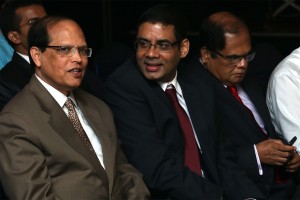Sri Lanka should take a cue from Bangladesh on dealing with NGOs
While Sri Lanka appears to be mortally frightened about NGOs, its authorities could take a cue from Bangladesh which has effectively used NGOs to reach the farming community, one of the most vulnerable and marginalised groups.
At an interactive session with Atiur Rahman, Governor Bangladesh Bank (Central Bank) on “Macroeconomic situation and Investment Opportunities in Bangladesh” held in Colombo this week organised by Commercial Bank of Ceylon, Dr. Rahman said that when the banks in Bangladesh were not interested in handling loans for share crop or tenant farmers an NGO, BRAC (Bangladesh Rural

Bangladesh Central Bank Governor in conversation with Commercial Bank Chairman Dinesh Weerakkody. Also in the picture is Dharma Dheerasinghe, Deputy Chairman who is set to take over when Mr. Weerakkody steps down tomorrow.
Advancement Committee), was entrusted with the responsibility and BRAC has disbursed Rs. 500 crores (500 x 10 million) implying that the micro-financing would be handled by NGOs in that country.
He said that small farmers and entrepreneurs are more reliable in the repayment of loans than the big corporate entities. “We are doing lot of inclusive financing,” he said. BRAC, he said, has been working in that country for some time and when the banks were not interested. Dr. Rahman said he straightaway released the money to BRAC from the Central Bank.
Dr. Rahman said that this has become a unique programme in the world of the share crop or tenant farmer getting the money from the banking system and it is straight from the Central Bank. He said “There is 100 per cent recovery and there is no problem”.
Some 900,000 plus share crop families have got the money, he said, adding that of them 55 per cent are women. “That is how we are reaching the key areas and all these farmers have paid back the loans.”
He said that they have made banking in that country as humane as possible and whether foreign or local banks, everyone has to join voluntarily in this inclusive social banking. He said that to observe the working of banking with the poor he has visited rural Bangladesh more than a hundred times along with CEOs of banks. There they have talked about agricultural loans and SME loans.
Stressing on the corporate social responsibility (CSR) of the banks, Dr. Rahman said that everyone knows that the banks are thriving on others’ money and not the money of the chairman of the bank. That is all depositors’ money, he said pointing out that part of that money should go back to the depositors and that is why they were pushing this kind of inclusive banking. He said that they are pumping more funds to make the small farmer, a small entrepreneur in the coming days.
He said, “That is how we are incorporating them into our mainstream financing activity. All banks and financial institutions in Bangladesh, private and government owned local and foreign, have engaged themselves with enthusiasm in these initiatives”. He said that there is tremendous scope for foreigners to invest in his country and noted that in fact there are thousands of Sri Lankans engaged in Bangladesh in middle managerial level employment in addition to other Sri Lankan investors and noted that the Commercial Bank has 18 branches in that country. He said that Sri Lankan investors could involve in areas like education, hospitals and hotels.
What is good about the Bangladesh economy, he said is that it is not volatile because it is consistently growing and never ever is it fluctuating so that despite all the shocks there is ample strength in it.
Per capita GDP has consequently been rising which has been built over the years, he said with poverty receding fast. The last five years has seen a 10 per cent reduction in poverty and what is good about it is that extreme poverty has been eradicated. He said that every farmer in Bangladesh has a bank account . All the farmers have this bank account. He said that no service charge can be charged on this. This is the CSR that the bank has to make. All the subsidies which are given to the farmers must go through this bank account and all the loans should also be channeled through this account, he said.


